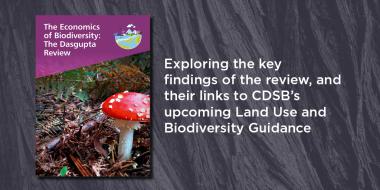CDSB’s Technical Manager Fiona Quinlan explores the key findings of the review, and their links to CDSB’s upcoming Biodiversity application guidance

Earlier this week the much-anticipated Final Report of the Dasgupta Review on the Economics of Biodiversity was published by the UK government. The independent review, led by economist Professor Sir Partha Dasgupta, represents a landmark in the recognition of the critical importance of biodiversity for long-term economic prosperity. It also strongly makes the case for CDSB’s ongoing work to advance the provision of decision-useful nature-related financial disclosure to investors, aligned to the recommendations of the Task Force on Climate-Related Financial Disclosure (TCFD).
The review’s findings have already received strong global endorsement from a wide range of influential government, financial, corporate and civil society stakeholders, including the World Bank, UN Environment Programme and Bank of England. Speaking at the launch of the report, UK Prime Minister Boris Johnson welcomed the findings of Professor Dasgupta’s review and signalled the intention to incorporate them in both UK policy and international diplomacy efforts:
“As co-host of COP26 and president of this year’s G7, we are going to make sure the natural world stays right at the top of the global agenda. And we will be leading by example here at home as we build back greener from the pandemic through my 10 point plan.”
What does the report say?
The report put forward a series of recommendations, targeted at fundamentally reassessing the means by which the protection and enhancement of biodiversity and nature’s assets are approached in economics. It calls for a reconceptualization of society’s relationship with nature, through the understanding that society, and the economy are embedded within nature, and cannot continue to treat the natural world as an ‘externality’ within economic and financial models. Put simply, nature needs to be ‘priced’ into financial markets in order to be effectively conserved and restored for future generations.
In a number of areas, the review’s findings closely tie with those of CDSB’s work. For example, Chapter 5 addresses Risk and Uncertainty, which considers the range of potential risks businesses and the economy may face from the continued overuse of nature and potential future ecosystem collapse. The CDSB Framework, has long recognised the important role of assessment and disclosure on the material risks and opportunities companies may face with respect to natural capital.
Additionally, Chapter 17 of the review considers Managing Nature-Related Financial Risk and Uncertainty, which discusses the importance for financial actors in taking into account the potential financially material impacts that depletion of natural assets may have for their activities and investments.
Achievement of CDSB’s mission to advance and align the global mainstream corporate reporting to equate natural capital and financial capital is therefore a vital precursor, to provide investors with the information they need to fully account for nature-related risks in their decision-making. However, evidence shows that to date few companies are adequately considering biodiversity-related risks in their environmental disclosures. Research undertaken by CDSB demonstrated that 46% of Europe’s largest companies included information on biodiversity in their 2020 reporting, and only 22% considered deforestation and forest degradation.
CDSB’s Biodiversity application guidance to support the integration of nature in corporate financial reporting
The Dasgupta Review clearly highlights the urgent and ambitious action that is required to halt and reverse biodiversity loss through a reworking of existing financial and economic institutions. In support of these goals, CDSB is supporting report preparers in the provision of decision-useful natural capital information.
We have developed Climate and Water application guidance to assist companies in the disclosure of material information on these issues in the mainstream report and over 2021 will also be working to develop the Biodiversity application guidance.
The Biodiversity guidance is expected to be released for consultation in summer 2021. It will be based on the CDSB Framework, which is aligned to the TCFD recommendations, and will provide an additional layer of detail to support companies in providing decision-useful nature-related financial disclosures to investors. It will build on existing reporting and assessment guidance relating to land use and biodiversity. To support the development of the guidance, CDSB is establishing a Land Use and Biodiversity Working Group, which will provide knowledge, expertise and feedback on the development of the guidance.
If you would be interested in participating in the Biodiversity Working Group please get in touch with CDSB’s Technical Director Ravi Abeywardana ravi.abeywardana@cdsb.net or Technical Manager Fiona Quinlan

With the contribution of the LIFE Programme of the European Union
The content of this page is the sole responsibility of the author and can under no circumstances be regarded as reflecting the position of the European Union